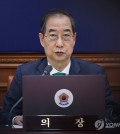- California Assembly OKs highest minimum wage in nation
- S. Korea unveils first graphic cigarette warnings
- US joins with South Korea, Japan in bid to deter North Korea
- LPGA golfer Chun In-gee finally back in action
- S. Korea won’t be top seed in final World Cup qualification round
- US men’s soccer misses 2nd straight Olympics
- US back on track in qualifying with 4-0 win over Guatemala
- High-intensity workout injuries spawn cottage industry
- CDC expands range of Zika mosquitoes into parts of Northeast
- Who knew? ‘The Walking Dead’ is helping families connect
(News Focus) S. Korean suppliers scramble to respond to looming U.S. auto parts tariffs
South Korean auto parts suppliers are scrambling to respond to new U.S. tariffs on imported vehicles and automotive parts, industry insiders said Friday, arguing the tariffs not only pose a serious challenge to automakers, including local industry leader Hyundai Motor Group, but also threaten to disrupt the broader industry supply chain.
The United States’ Donald Trump administration began imposing a 25 percent tariff on imported vehicles last week and is set to extend the same rate to auto parts beginning May 3, a move that has disrupted production planning and investment strategies across the sector.
While much of the recent attention has focused on finished vehicle exports, South Korea’s parts suppliers are also grappling with mounting uncertainties and risks, according to industry officials.
“We are currently reviewing the possibility of increasing production at our U.S. facility in Alabama,” said a manager at a company based in Siheung, Gyeonggi Province, while requesting anonymity for himself and his company. “We have launched an internal task force to review practical responses, and we are in constant communication with Hyundai Motor Group to coordinate strategies.”
He noted that the company’s products are used in the production of about 320,000 engines annually for Hyundai Motor Group’s vehicles in the U.S.
“We are not holding onto optimistic hopes that the auto tariffs will be rescinded. Instead, we are preparing for the worst,” the official said. “The automakers will not be able to shoulder all of the costs related to tariffs, so we are also reviewing our own measures.”
While Hyundai Motor Group may have the financial resources to temporarily absorb tariff-related costs, suppliers are concerned that many smaller firms may not survive without price increases, which would inevitably undermine their competitiveness, especially in the U.S., leading to possible declines in their sales and profitability.
Hyundai Motor Co. announced last week that it will freeze prices of all new vehicles sold in the United States through early June, a move aimed at easing consumer concerns over rising costs following the new duties.
Another supplier in North Gyeongsang Province echoed similar concerns.
“There is no clear solution other than expanding local production in the U.S., but it is not something that can be done overnight. Labor and operating costs are much higher there,” an official at the parts manufacturer said, asking not to be identified.
According to the official, the company operates a plant in Savannah, Georgia, and currently splits its U.S. supplies 50:50 between shipments from Korea and local production. The company’s parts are used in the production of some 2.8 million Hyundai and Kia vehicles annually.
“Auto manufacturers and suppliers are still analyzing the situation,” she said. “For now, we are maintaining current level operations and waiting to see if the U.S. government possibly announces a grace period or a reversal before the May 3 deadline.”
The uncertainty is further complicated by the unpredictability of the U.S. trade policy.
Trump on Wednesday (U.S. time) lowered Washington’s reciprocal tariffs – announced separately from the automotive sectoral tariffs — on South Korea and other trading partners to 10 percent, in what he called a pause that will last for 90 days, while increasing reciprocal duties on China to 125 percent following Beijing’s retaliatory move.
A manager at another parts company based in Gyeongju, North Gyeongsang Province, said: “U.S. tariff policy keeps changing. We are monitoring developments, but it’s difficult to make investment decisions under these conditions.”
The company also operates a U.S. facility, but much of its raw materials needed there are still exported from South Korea.
“We cannot immediately make new facility investments in the U.S. just because tariffs are going into effect. We need to review any response while considering our clients’ production schedules,” he said.
“Whether we can increase prices to offset tariff burdens will need to be discussed with our clients,” said the official, whose company works not only with Hyundai Motor Group but with other global manufacturers as well.
The South Korean Ministry of Trade, Industry and Energy announced this week that it will funnel additional liquidity of 2 trillion won (US$1.35 billion) into the local automotive industry facing headwinds from U.S. tariffs on car imports. Automobiles are South Korea’s top export item to the U.S.
The value of South Korea’s auto exports to America reached US$34.7 billion last year, accounting for nearly half of the country’s total auto exports, according to government data. The country exported $8.2 billion worth of auto parts in 2024.
The ministry said major car manufacturers will likely see a decline in sales due to the U.S. tariffs, with small and medium-sized auto parts manufacturers, in particular, expected to suffer more serious damage.











